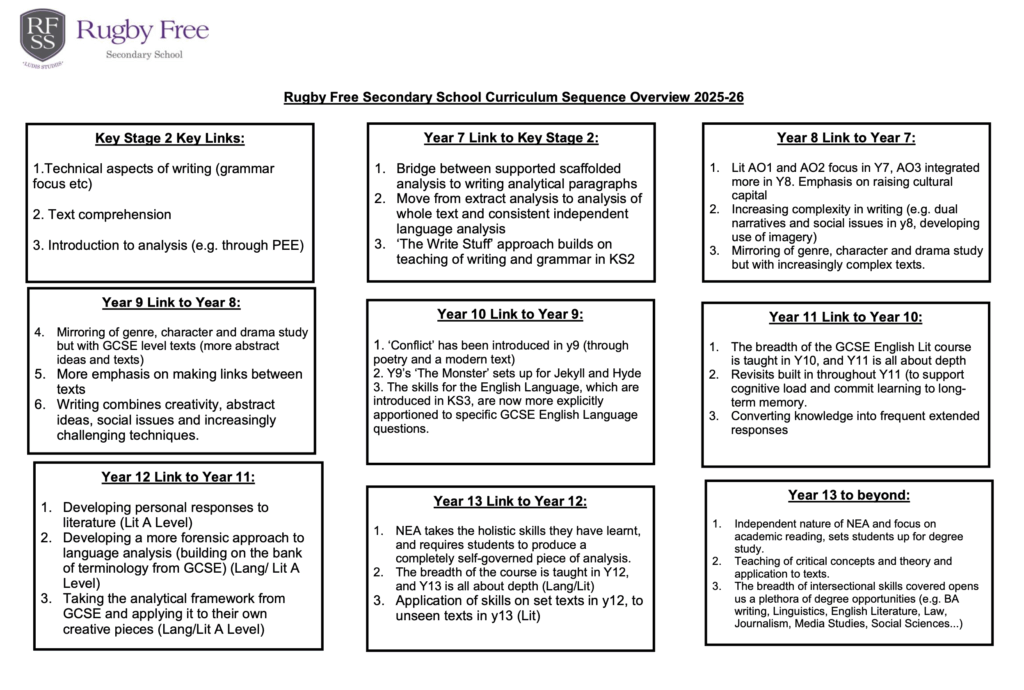Education and society are rooted in English. History is documented, perspectives are captured, and empathy developed through literature. A high-quality education in English will teach students to speak and write fluently so that they can communicate their ideas and emotions to others.
Through reading and listening, others are able to communicate their ideas and emotions with them. It is through reading that students are able to develop culturally, emotionally, intellectually and socially, enabling them to acquire knowledge and build on their existing knowledge.
English Department – Overarching Curriculum Intent (September 2025)
RFSS Curriculum Vision Statement:
We intend to provide a broad, inclusive and ambitious curriculum that empowers our students to make both academic and personal progress. As a school with a diverse demographic, our aim is to ensure that all students achieve an excellent standard of education that not only prepares them for GCSE and A Level examinations, but ensures they are ‘set for life’ beyond the gates of Rugby Free Secondary School. As a consequence, all of our work is underpinned by our core values of: Kindness, Respect, Curiosity, Resilience, Collaboration and Endeavour.
English Curriculum in Context:
With more than a third of our students experiencing higher than average levels of deprivation, we are acutely aware of the impact this has on both literacy levels and cultural capital. With this in mind, we carefully craft our curriculum to include texts that inspire and engage our pupils, stimulating debate and acting as spring-boards for their own writing and thinking skills. We have built a curriculum around the diverse nature of our cohort, so that students see themselves reflected, and see English as a way to understand the world around them. Due to the ongoing legacy of COVID-19, research has indicated ‘particularly negative impacts on reading for secondary school students’. Despite the passage of time, we continue to see a detrimental impact as primary school closures had ‘a greater impact on primary reading on average’ and ‘writing outcomes for primary-aged children were lower than expected compared to previous year groups’ (The Impact of COVID-19 on Learning: May 22). Therefore, we aim to ensure that we are not only building upon previous knowledge in our English Curriculum, but are consistently filling in gaps that are evident. We are also noticing the generational change where school-age pupils now have more control of the media they consume, which in turn limits their cultural capital. Short-term media forms are becoming increasingly popular, meaning that sustained exploration of ideas across longer texts is something we need to explicitly teach. This was evidenced in our 2024 GCSE results, where Literature lagged some way behind Language. This has resulted in a change to our intervention curriculum where deeper knowledge and exploration of literature texts is now specifically foregrounded.
Curriculum Aims:
Our curriculum aims to:
- Ensure our students view language skills, from a written, analytical and spoken perspective, as a springboard to create more opportunities in life and facilitate the ability to become a greater stakeholder in society.
- Empower our students to communicate effectively and independently (developing their core literacy skills)
- Fully support our students’ moral and cultural understanding of the modern world
- Inspire our students to explore and develop their own ideas creatively
- Empower our students to:
-
-
- Know more about the texts we study and their contexts
- Remember more about the methods used by writers
- Apply this knowledge regularly in their own extended responses
-
-
Our broad and balanced curriculum concentrates on developing our students’ key knowledge and skills and enhances their understanding of the world around them.
We do this by:
- Encouraging a love of language and developing and nuancing students’ vocabularies so that they can be both precise and concise in their written and spoken communication.
- Stimulating intellectual curiosity about texts and allowing for independent exploration of these ideas.
- Facilitating collaboration, where students work with each other to develop and challenge ideas on texts and in their own writing.
- Promoting challenge for all through both the texts we teach and the tools we provide students with to interrogate them. We see explicit teaching of vocabulary as a core element of this.
- Enabling creativity, by supporting students to develop their own authorial and journalistic voices.
- Sequencing learning so that the texts, ideas, and styles of writing they engage with are logically progressed, taking into account individual starting points.
- Revisiting previous learning of analytical approaches, vocabulary, methods and key literary ideas to support the transfer to long-term memory.
Our curriculum is focused on the development of communication, character and cultural capital of each individual student, so they become:
- Empathetic citizens who understand the power of writing and language in society.
- Resilient learners who reflect on their work, and the work of others in order to make progress.
- Creative thinkers who challenge and develop interpretations, and reflect this nuanced understanding in their own writing.
- Articulate individuals who can verbalise their own thoughts, ideas and emotions.
- Hard-working students who are committed to fully developing and exploring their ideas.
Curriculum Outcome:
As a result of our curriculum, students will leave RFSS competent in the skills of reading, writing and spoken language. They will also be empowered in their thinking, viewing the world through a critical lens and understanding that their voices have the power to change it.

